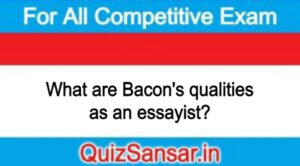
What are Bacon’s qualities as an essayist?
What are Bacon’s qualities as an essayist?
Ans.
Bacon as an Essayist
Introduction: Sir Francis Bacon was a great scholar, a jurist, a Parliamentarian, an orator, an empirical scientist and a distinguished man of letters. He was the true representative of his age, and a child of the Renaissance. He was a man of great versatility. He imported into English a new genre called the Essay and was himself called the ‘Father of the English Essay’. His contribution to the development of English prose style laid the foundation of the modern English prose and he was known as the Father of the Modern English prose. Bacon not only imported the Essay from France but also enriched it with his contributions which became so popular that they ran into three editions in his own lifetime (in 1597, 1962 and 1626).
Although Bacon’s essays are not intimate, they afford sufficient authentic testimony to the real character of the author. Bacon took the form Montaigne who declared that he (Montaigne) was the subject of his essays but Bacon was impersonal and objective. The subject of bacon’s essays are ‘counsels, civil and moral’ according to Bacon himself. Bacon writes to preach. Polarize, guide his readers to achieve success. Bacon writes mostly for the benefit of the princes and the aristocrats. But in guiding and moralizing, in observing and commenting Bacon reveals his own personality which was undoubtedly versatile and colourful and impressive though not endearing.
Child of the Renaissance: Bacon was born in 1561, in the Elizabethan age. The period in which Bacon was born and brought up was a period of great significance. It was the period when Renaissance spirit was in full cry. It was a period of great glory and prosperity for England in all spheres of national activity. In science, literature, trade, commerce, education and politics signs of creative endeavour were discernible.
Scholarship and Wisdom: Bacon was a child of the Renaissance. He was a highly educated, scholarly, widely travelled and experienced man. All these ingredients made Bacon an accomplished man of great practical wis dom. He was a classical scholar steeped in history, mythology, religion and science. He had taken all knowledge to be his province. His essays are full of references and allusions to great religious, social and historical events. He takes recourse to the vast storehouse of knowledge to elucidate, illustrate or consolidate his argument and drive his point home.
Ignoble Instinct in Bacon: Bacon emerges as a versatile genius in his Essays. He is scholarly, wise, experienced and practical to the core of his heart. There is great nobility in his Essays which naturally does him great credit and which has immortalized Bacon. But alongside there is a disturbing element which has eclipsed his greatness and provoked Pope. Blake and many others to fulminate against him. Bacon has not hesitated to give advice which go against the accepted ethics and mortality. To Bacon nothing seems sacred if it hinders the pursuit of greatness or personal advancement. Any number of instances can be enumerated to prove this.
Subject of the Essays: The remarkable quality of Bacon is that he took his subjects from everyday life. Even the ordinary men and women felt interested in reading them. They are full of worldly wisdom with practical advice for life. But sometimes he appears too practical. In one of his essays he advocates deserting friendship if the friend serves no purpose. This makes him look like too selfish. But in the essay ‘Of Truth’ he says, ……….clear and round dealing is the honour of man’s nature…………”. he further says. “Certainly. It is heaven upon earth, to have a man’s mind move in charity, rest in providence, turn upon the poles of truth.
His Style: Bacon is well known in the field of literature for his style. It is believed that he had more than one style. Actually he changed his style according to the subject under discussion. Like all writers of the period, he also punctuated his essays with Latin expression which give him depth and elegance. But his sentences are not musical or graceful as is the case with others like Browne and Milton. Bacon is perhaps the briefest in English essayists. In the essays of his earlier period Bacon rarely uses connectives. But in his later essays he appears more cohesive and finished. The use of connectives can be seen. He says, “Virtues are like precious odours, most fragrant when they are burnt or crushed.
Lucidity of Style: In spite of good does of Latinism and brevity. Bacon maintains a lucidity of style. He is most quotable of English essayists. His statements in ‘Of Studies’ such as, “Studies serve for delight, for ornamentation and for ability” and “Reading maketh a full man, conference a ready man and writing an exact man” are a pleasure to read. As Hugh Walker says, “Bacon is the first of English essayists and for sheer man and weight of genius, the greatest.” His contribution as the father of English essay has been acknowledge by all with respect and admiration.
-
Write the critical appreciation of the poem No. 12 entitled Far Below Flowed.
-
Write the critical appreciation of the poem No. 11 entitled Leave this Chanting.






